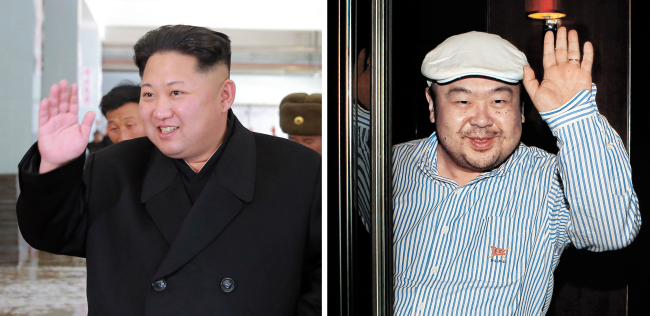The murder of Kim Jong-nam, the estranged half-brother of the North Korean leader Kim Jong-un, could have been engineered by a North Korean faction loyal to the current chief to eliminate a possible threat to the regime, South Korean experts said Wednesday.
In interviews with The Korea Herald, the pundits also asserted that the killing may have been motivated by Kim Jong-un’s concern that the elder Kim may seek political asylum in other countries and become the most high-profile dissenter of the Stalinist regime.
The views were contrary to the assessment of South Korea’s top spy agency, the National Intelligence Service, which told lawmakers Wednesday that the incident is presumed to have been based on Kim Jong-un’s “paranoia” about his older half-brother, rather than a calculated decision.
“In order to show their loyalty to the leader Kim, some fervent subordinates might have acted on a tacit order from him to take out Kim Jong-nam” said Ahn Chan-il, director of the World North Korea Research Center and former North Korean military officer who fled to South Korea in 1979.

Kim Jong-nam, 47, died Monday after being attacked with poison by two unidentified women at a Kuala Lumpur airport while waiting for a flight to Macau, where his family members live, according to Malaysian police and the NIS. It has not yet been confirmed whether North Korea was behind the attack.
Ahn noted there must have been an “urgent need” to assassinate Kim Jong-nam, adding that the Kim Jong-un may have been extremely unnerved by the possibility that his outspoken, flamboyant half-brother might seek asylum in South Korea and western countries.
In 2012, there was a rumor that Kim Jong-nam considered defection to South Korea. Recently a local media reported that South Korea had tried to negotiate his defection, but the effort failed due to differences over the terms and conditions.
Cheong Seong-chang, a senior researcher at the Sejong Institute, said the very report could have angered Kim Jong-un, prompting him to order assassination of what he viewed as “real threat” to his leadership.
“Without approval of Kim Jong-un, assassination of Kim Jong-nam never would have happened,” said Cheong. “If the elder Kim blackmailed the younger Kim with a threat to defect, Pyongyang’s leadership would have chosen to assassinate him, instead of considering a compromise.”
Chung speculated that General Bureau of Reconnaissance, Pyongyang’s intelligence agency which manages the communist state’s clandestine operations against South Korea, may have orchestrated the murder, saying the agency is in charge of taking out dissenting officials and has been spying on Kim Jong-nam.
Earlier in the day, the NIS said the killing of Kim Jong-nam had been a “standing order” for North Korean agents since 2012, when he reportedly sought asylum in South Korea. The intelligence service added that Kim Jong-nam also asked Kim not to kill him and his family members.
Yang Moo-jin, a political science professor at the University of North Korean Studies, agreed that Kim Jong-un might have took a “specific step” that led to the assassination, speculating that the deceased may have tried to come to South Korea or refused to return to the North in defiance of the leader’s order.
“I suspect Kim Jong-nam definitely did something that hurts the reputation of North Korea’s supreme leader Kim Jong-un, which the North viewed as the most serious crime,” said Yang. “Defection attempts, refusal to obey the order… anything could be possible.”

Regarding the motive for taking out his own brother, experts noted that Kim Jong-un was “extremely nervous” about Kim Jong-nam’s harsh criticism against his power structure amid the rumors that the elder Kim might have been supported by China, main ally of North Korea.
“From the Kim Jong-un regime’s point of view, Kim Jong-nam is like a pain in the ass,” said Ko Yoo-hwan, a professor of North Korean Studies at Dongguk University. “The people in Pyongyang might have been afraid that Kim would work as a dissenter.”
Kim Jong-nam, since falling out of the succession race after his mother, Sung Hae-rim, was rejected by the late leader Kim Jong-il, has been living outside North Korea. He had stayed in China for a while and later moved around South East Asian such as Malaysia and Singapore.
But the experts dismissed the idea that Kim Jong-nam was a Chinese favorite pick to replace the current leader in the event of insurgency in the North, saying that the scenario was “scrapped” after Kim Jong-un executed his uncle Jang Sung-thaek, a pro-Chinese high-profile official.
For this reason, analysts predicted little impact from Kim’s death on the North’s relations with China, but Pyongyang will face international condemnation and risk being branded a state sponsor of terror by the US again. Washington took the North off the terrorism sponsor list in 2008.
“Electing Kim Jong-nam as a replacement for Kim Jong-un is an old narrative from before the execution of Jang,” said Ko. “As opposed to worsening relations with China, (Kim’s death) could enhance North Korea’s image as a rogue state.”
(jasonyeo@heraldcorp.com)








![[KH Explains] Hyundai's full hybrid edge to pay off amid slow transition to pure EVs](http://res.heraldm.com/phpwas/restmb_idxmake.php?idx=644&simg=/content/image/2024/04/18/20240418050645_0.jpg&u=20240419100350)






![[From the Scene] Monks, Buddhists hail return of remains of Buddhas](http://res.heraldm.com/phpwas/restmb_idxmake.php?idx=652&simg=/content/image/2024/04/19/20240419050617_0.jpg&u=20240419175937)

![[KH Explains] Hyundai's full hybrid edge to pay off amid slow transition to pure EVs](http://res.heraldm.com/phpwas/restmb_idxmake.php?idx=652&simg=/content/image/2024/04/18/20240418050645_0.jpg&u=20240419100350)

![[Today’s K-pop] Illit drops debut single remix](http://res.heraldm.com/phpwas/restmb_idxmake.php?idx=642&simg=/content/image/2024/04/19/20240419050612_0.jpg&u=)